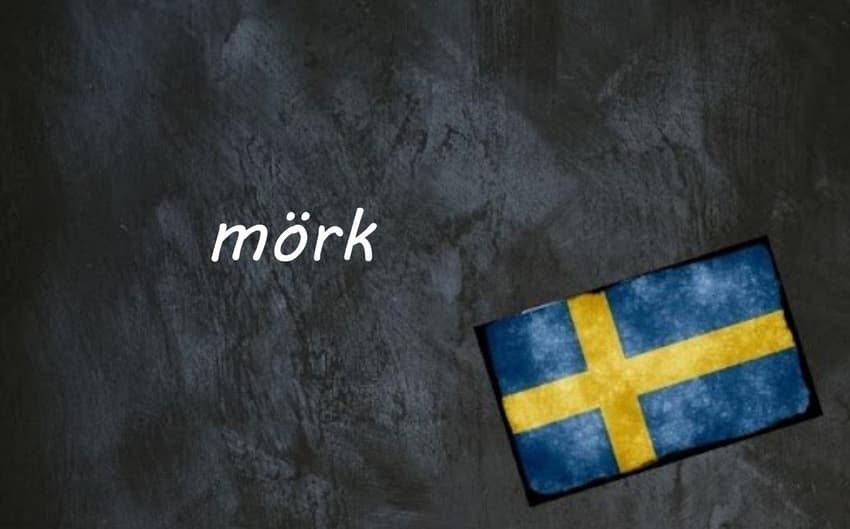Swedish word of the day: mörk

Mörk is a word you'll hear a lot during autumn and winter in Sweden, but where does it come from and how exactly do you use it? We've got the answers.
Mörk means "dark"; it's the opposite of ljus (light/pale).
You can use mörk to describe a noun, whether it's a tangible object or something more abstract, for example ett mörkt rum (a dark room) or en mörk natt (a dark night).
Mörk can also modify a colour adjective (such as blå or grön), in which case you simply combine both words to make a compound adjective, like mörkblå (dark blue) or mörkgrön (dark green), in contrast to English where both words would be kept separate. It can also be combined with other kinds of adjectives and adverbs, for example mörkhårig (brunette, or literally "dark-haired").
But it's not always got anything to do with colour or lightness.
Like in English, mörk can be used metaphorically to talk about something sinister, not completely rational or understood, for example mörk magi (dark magic or black magic) or mörk materia (dark matter). And it can mean "gloomy" or "negative", for example mörka tider (dark times) or the phrases teckna en mörk bild (to paint a gloomy picture) or kasta en mörk skugga över (to cast a dark cloud over).
A good way for English-speakers to remember this word is to think of the similarity to "murky", which means "obscured/difficult to see". In fact, both words have a shared origin, and until around 200-300 years ago, "murk" was used as an adjective in English, including by William Shakespeare.
Both words come from the Old Norse word myrkr (darkness), and if you look even further back in linguistic history, there was an even older Germanic word merkwjo. Several other Scandinavian languages have related words: Norwegian and Danish mørk and Icelandic myrkur.
And don't forget to learn some of the related words to mörk. Mörkhet means "darkness", which again can be both literal or figurative, and mörkrädd is "scared of the dark".
Examples
Det finns mörka krafter som väntar i kulisserna
There are dark powers waiting behind the scenes
Det blir mörkare på morgonen
It's getting darker in the mornings
Comments (2)
See Also
Mörk means "dark"; it's the opposite of ljus (light/pale).
You can use mörk to describe a noun, whether it's a tangible object or something more abstract, for example ett mörkt rum (a dark room) or en mörk natt (a dark night).
Mörk can also modify a colour adjective (such as blå or grön), in which case you simply combine both words to make a compound adjective, like mörkblå (dark blue) or mörkgrön (dark green), in contrast to English where both words would be kept separate. It can also be combined with other kinds of adjectives and adverbs, for example mörkhårig (brunette, or literally "dark-haired").
But it's not always got anything to do with colour or lightness.
Like in English, mörk can be used metaphorically to talk about something sinister, not completely rational or understood, for example mörk magi (dark magic or black magic) or mörk materia (dark matter). And it can mean "gloomy" or "negative", for example mörka tider (dark times) or the phrases teckna en mörk bild (to paint a gloomy picture) or kasta en mörk skugga över (to cast a dark cloud over).
A good way for English-speakers to remember this word is to think of the similarity to "murky", which means "obscured/difficult to see". In fact, both words have a shared origin, and until around 200-300 years ago, "murk" was used as an adjective in English, including by William Shakespeare.
Both words come from the Old Norse word myrkr (darkness), and if you look even further back in linguistic history, there was an even older Germanic word merkwjo. Several other Scandinavian languages have related words: Norwegian and Danish mørk and Icelandic myrkur.
And don't forget to learn some of the related words to mörk. Mörkhet means "darkness", which again can be both literal or figurative, and mörkrädd is "scared of the dark".
Examples
Det finns mörka krafter som väntar i kulisserna
There are dark powers waiting behind the scenes
Det blir mörkare på morgonen
It's getting darker in the mornings
Join the conversation in our comments section below. Share your own views and experience and if you have a question or suggestion for our journalists then email us at [email protected].
Please keep comments civil, constructive and on topic – and make sure to read our terms of use before getting involved.
Please log in here to leave a comment.